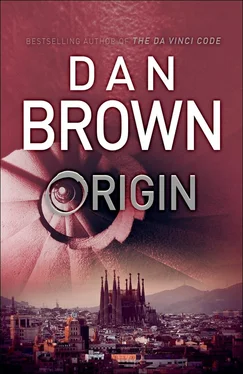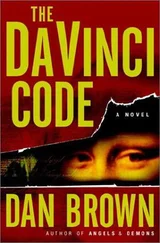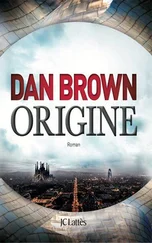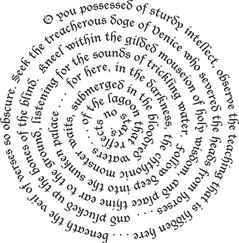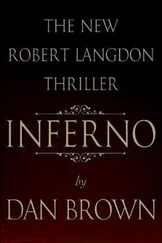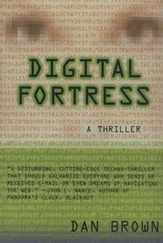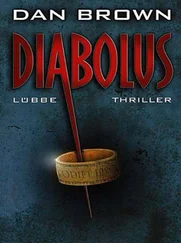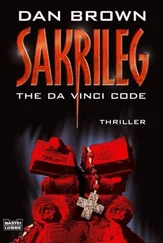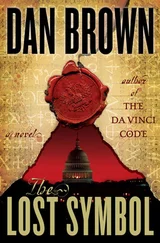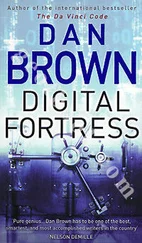“The invitation said black and white,” Langdon said. “I trust tails are appropriate?”
“Tails are a classic! You look dashing!” The man scurried over and carefully pressed a name tag to the lapel of Langdon’s jacket.
“It’s an honor to meet you, sir,” the mustached man said. “No doubt you’ve visited us before?”
Langdon gazed through the spider’s legs at the glistening building before them. “Actually, I’m embarrassed to say, I’ve never been.”
“No!” The man feigned falling over. “You’re not a fan of modern art?”
Langdon had always enjoyed the challenge of modern art — primarily the exploration of why particular works were hailed as masterpieces: Jackson Pollock’s drip paintings; Andy Warhol’s Campbell’s Soup cans; Mark Rothko’s simple rectangles of color. Even so, Langdon was far more comfortable discussing the religious symbolism of Hieronymus Bosch or the brushwork of Francisco de Goya.
“I’m more of a classicist,” Langdon replied. “I do better with da Vinci than with de Kooning.”
“But da Vinci and de Kooning are so similar !”
Langdon smiled patiently. “Then I clearly have a bit to learn about de Kooning.”
“Well, you’ve come to the right place!” The man swung his arm toward the massive building. “In this museum, you will find one of the finest collections of modern art on earth! I do hope you enjoy.”
“I intend to,” Langdon replied. “I only wish I knew why I’m here.”
“You and everyone else!” The man laughed merrily, shaking his head. “Your host has been very secretive about the purpose of tonight’s event. Not even the museum staff knows what’s happening. The mystery is half the fun of it — rumors are running wild! There are several hundred guests inside — many famous faces — and nobody has any idea what’s on the agenda tonight!”
Now Langdon grinned. Very few hosts on earth would have the bravado to send out last-minute invitations that essentially read: Saturday night. Be there. Trust me. And even fewer would be able to persuade hundreds of VIPs to drop everything and fly to northern Spain to attend the event.
Langdon walked out from beneath the spider and continued along the pathway, glancing up at an enormous red banner that billowed overhead.
AN EVENING WITH
EDMOND KIRSCH
Edmond has certainly never lacked confidence , Langdon thought, amused.
Some twenty years ago, young Eddie Kirsch had been one of Langdon’s first students at Harvard University — a mop-haired computer geek whose interest in codes had led him to Langdon’s freshman seminar: Codes, Ciphers, and the Language of Symbols. The sophistication of Kirsch’s intellect had impressed Langdon deeply, and although Kirsch eventually abandoned the dusty world of semiotics for the shining promise of computers, he and Langdon had developed a student — teacher bond that had kept them in contact over the past two decades since Kirsch’s graduation.
Now the student has surpassed his teacher , Langdon thought. By several light-years.
Today, Edmond Kirsch was a world-renowned maverick — a billionaire computer scientist, futurist, inventor, and entrepreneur. The forty-year-old had fathered an astounding array of advanced technologies that represented major leaps forward in fields as diverse as robotics, brain science, artificial intelligence, and nanotechnology. And his accurate predictions about future scientific breakthroughs had created a mystical aura around the man.
Langdon suspected that Edmond’s eerie knack for prognostication stemmed from his astoundingly broad knowledge of the world around him. For as long as Langdon could remember, Edmond had been an insatiable bibliophile — reading everything in sight. The man’s passion for books, and his capacity for absorbing their contents, surpassed anything Langdon had ever witnessed.
For the past few years, Kirsch had lived primarily in Spain, attributing his choice to an ongoing love affair with the country’s old-world charm, avant-garde architecture, eccentric gin bars, and perfect weather.
Once a year, when Kirsch returned to Cambridge to speak at the MIT Media Lab, Langdon would join him for a meal at one of the trendy new Boston hot spots that Langdon had never heard of. Their conversations were never about technology; all Kirsch ever wanted to discuss with Langdon was the arts.
“You’re my culture connection, Robert,” Kirsch often joked. “My own private bachelor of arts!”
The playful jab at Langdon’s marital status was particularly ironic coming from a fellow bachelor who denounced monogamy as “an affront to evolution” and had been photographed with a wide range of supermodels over the years.
Considering Kirsch’s reputation as an innovator in computer science, one could easily have imagined him being a buttoned-up techno-nerd. But he had instead fashioned himself into a modern pop icon who moved in celebrity circles, dressed in the latest styles, listened to arcane underground music, and collected a wide array of priceless Impressionist and modern art. Kirsch often e-mailed Langdon to get his advice on new pieces of art he was considering for his collection.
And then he would do the exact opposite , Langdon mused.
About a year ago, Kirsch had surprised Langdon by asking him not about art, but about God — an odd topic for a self-proclaimed atheist. Over a plate of short-rib crudo at Boston’s Tiger Mama, Kirsch had picked Langdon’s brain on the core beliefs of various world religions, in particular their different stories of the Creation.
Langdon gave him a solid overview of current beliefs, from the Genesis story shared by Judaism, Christianity, and Islam, all the way through the Hindu story of Brahma, the Babylonian tale of Marduk, and others.
“I’m curious,” Langdon asked as they left the restaurant. “Why is a futurist so interested in the past? Does this mean our famous atheist has finally found God?”
Edmond let out a hearty laugh. “Wishful thinking! I’m just sizing up my competition, Robert.”
Langdon smiled. Typical. “Well, science and religion are not competitors, they’re two different languages trying to tell the same story. There’s room in this world for both.”
After that meeting, Edmond had dropped out of contact for almost a year. And then, out of the blue, three days ago, Langdon had received a FedEx envelope with a plane ticket, a hotel reservation, and a handwritten note from Edmond urging him to attend tonight’s event. It read: Robert, it would mean the world to me if you of all people could attend. Your insights during our last conversation helped make this night possible.
Langdon was baffled. Nothing about that conversation seemed remotely relevant to an event that would be hosted by a futurist.
The FedEx envelope also included a black-and-white image of two people standing face-to-face. Kirsch had written a short poem to Langdon.
Robert,
When you see me face-to-face,
I’ll reveal the empty space.
— Edmond

Langdon smiled when he saw the image — a clever allusion to an episode in which Langdon had been involved several years earlier. The silhouette of a chalice, or Grail cup, revealed itself in the empty space between the two faces.
Now Langdon stood outside this museum, eager to learn what his former student was about to announce. A light breeze ruffled his jacket tails as he moved along the cement walkway on the bank of the meandering Nervión River, which had once been the lifeblood of a thriving industrial city. The air smelled vaguely of copper.
Читать дальше
